ANT2APA: Examining Youth Development Through Applied Anthropology
VerifiedAdded on 2023/03/30
|10
|2238
|386
Essay
AI Summary
This essay delves into the multifaceted field of youth development, employing an anthropological perspective to analyze its core principles and practices. It begins by highlighting the shift in youth development strategies from single-issue programs to more comprehensive approaches, emphasizing the significance of nurturing internal strengths within youth communities. The essay explores the biological anthropological viewpoint, contrasting human adolescence with other primates and social mammals. It then examines key theoretical frameworks, including Erikson's stages of development, which outline critical assets necessary for successful adulthood, such as trust, self-sufficiency, initiative, and a strong sense of identity. Furthermore, the essay discusses various youth development models, including the 'Five Cs' (Competence, Confidence, Connection, Character, and Compassion) and the Services, Opportunities, and Supports (SOS) approach. The anthropological approach is contrasted with these theoretical models, emphasizing the role of society and community in shaping youth, globalization's impact, and the importance of ethnographic frameworks. The essay concludes by underscoring the significance of community strengthening for sustainable youth development and preparing young people to meet the challenges of adolescence to achieve their full potential.

Running head: SOCIOLOGY
SOCIOLOGY
Name of the student
Name of the university
Author note
SOCIOLOGY
Name of the student
Name of the university
Author note
Paraphrase This Document
Need a fresh take? Get an instant paraphrase of this document with our AI Paraphraser
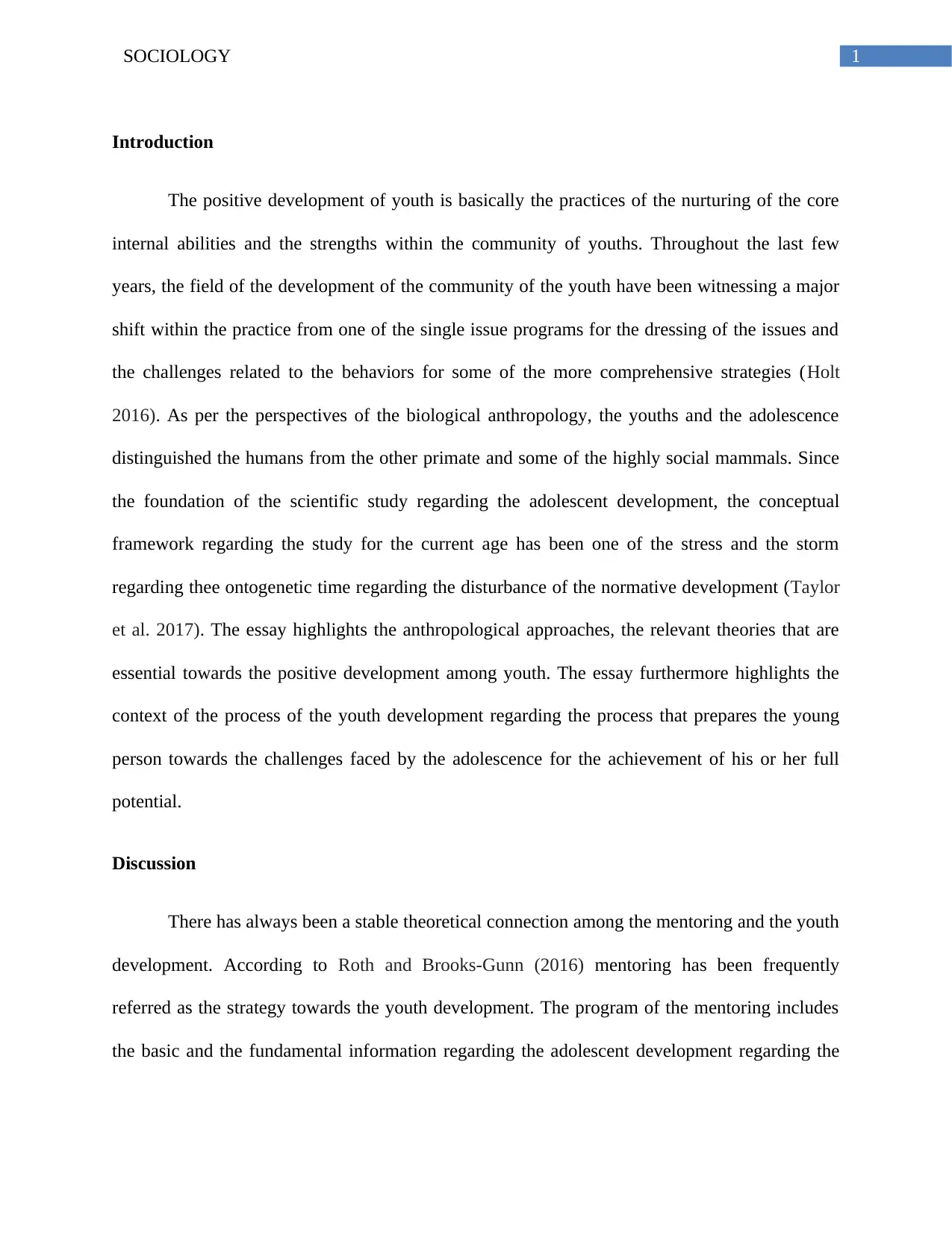
SOCIOLOGY 1
Introduction
The positive development of youth is basically the practices of the nurturing of the core
internal abilities and the strengths within the community of youths. Throughout the last few
years, the field of the development of the community of the youth have been witnessing a major
shift within the practice from one of the single issue programs for the dressing of the issues and
the challenges related to the behaviors for some of the more comprehensive strategies (Holt
2016). As per the perspectives of the biological anthropology, the youths and the adolescence
distinguished the humans from the other primate and some of the highly social mammals. Since
the foundation of the scientific study regarding the adolescent development, the conceptual
framework regarding the study for the current age has been one of the stress and the storm
regarding thee ontogenetic time regarding the disturbance of the normative development (Taylor
et al. 2017). The essay highlights the anthropological approaches, the relevant theories that are
essential towards the positive development among youth. The essay furthermore highlights the
context of the process of the youth development regarding the process that prepares the young
person towards the challenges faced by the adolescence for the achievement of his or her full
potential.
Discussion
There has always been a stable theoretical connection among the mentoring and the youth
development. According to Roth and Brooks-Gunn (2016) mentoring has been frequently
referred as the strategy towards the youth development. The program of the mentoring includes
the basic and the fundamental information regarding the adolescent development regarding the
Introduction
The positive development of youth is basically the practices of the nurturing of the core
internal abilities and the strengths within the community of youths. Throughout the last few
years, the field of the development of the community of the youth have been witnessing a major
shift within the practice from one of the single issue programs for the dressing of the issues and
the challenges related to the behaviors for some of the more comprehensive strategies (Holt
2016). As per the perspectives of the biological anthropology, the youths and the adolescence
distinguished the humans from the other primate and some of the highly social mammals. Since
the foundation of the scientific study regarding the adolescent development, the conceptual
framework regarding the study for the current age has been one of the stress and the storm
regarding thee ontogenetic time regarding the disturbance of the normative development (Taylor
et al. 2017). The essay highlights the anthropological approaches, the relevant theories that are
essential towards the positive development among youth. The essay furthermore highlights the
context of the process of the youth development regarding the process that prepares the young
person towards the challenges faced by the adolescence for the achievement of his or her full
potential.
Discussion
There has always been a stable theoretical connection among the mentoring and the youth
development. According to Roth and Brooks-Gunn (2016) mentoring has been frequently
referred as the strategy towards the youth development. The program of the mentoring includes
the basic and the fundamental information regarding the adolescent development regarding the
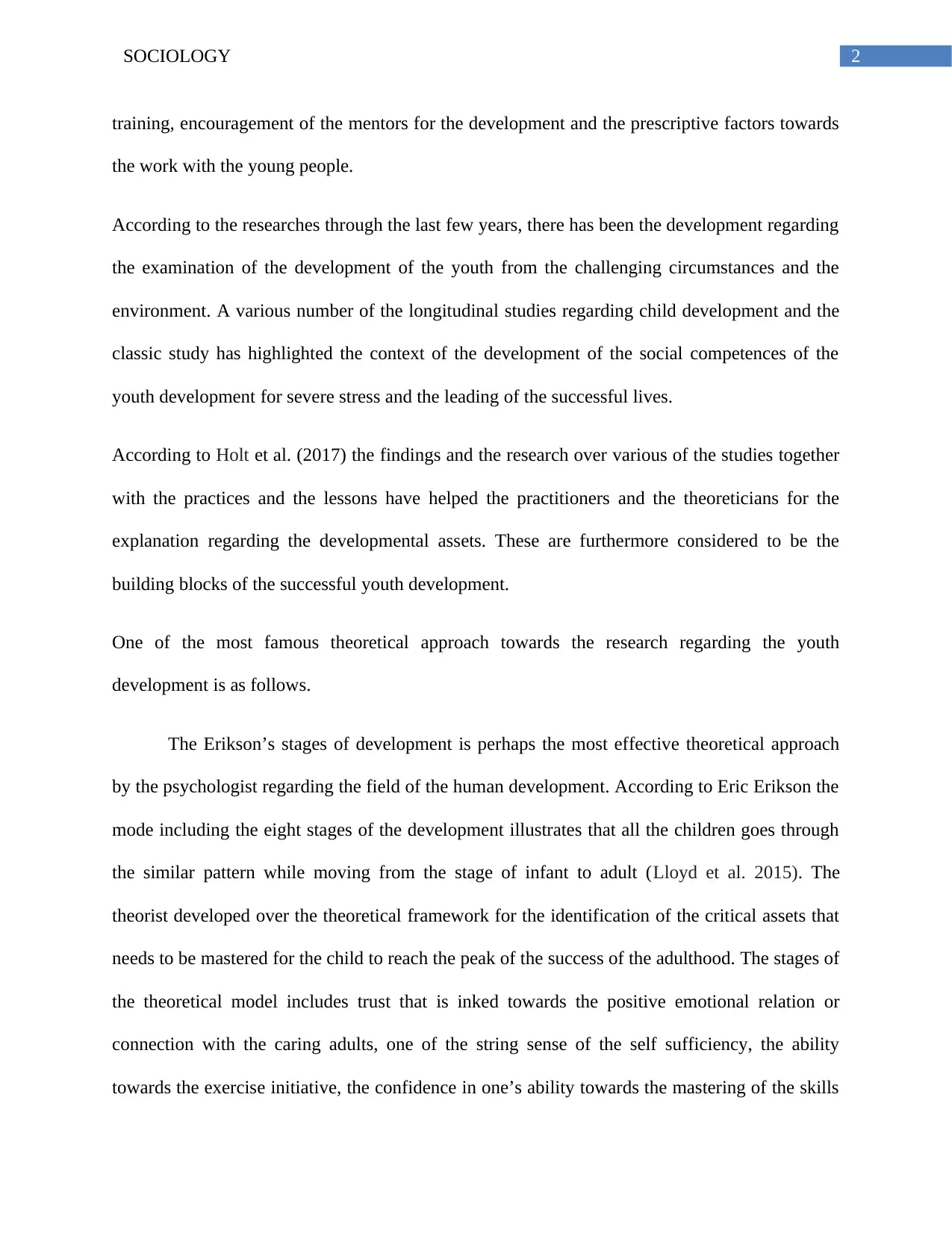
2SOCIOLOGY
training, encouragement of the mentors for the development and the prescriptive factors towards
the work with the young people.
According to the researches through the last few years, there has been the development regarding
the examination of the development of the youth from the challenging circumstances and the
environment. A various number of the longitudinal studies regarding child development and the
classic study has highlighted the context of the development of the social competences of the
youth development for severe stress and the leading of the successful lives.
According to Holt et al. (2017) the findings and the research over various of the studies together
with the practices and the lessons have helped the practitioners and the theoreticians for the
explanation regarding the developmental assets. These are furthermore considered to be the
building blocks of the successful youth development.
One of the most famous theoretical approach towards the research regarding the youth
development is as follows.
The Erikson’s stages of development is perhaps the most effective theoretical approach
by the psychologist regarding the field of the human development. According to Eric Erikson the
mode including the eight stages of the development illustrates that all the children goes through
the similar pattern while moving from the stage of infant to adult (Lloyd et al. 2015). The
theorist developed over the theoretical framework for the identification of the critical assets that
needs to be mastered for the child to reach the peak of the success of the adulthood. The stages of
the theoretical model includes trust that is inked towards the positive emotional relation or
connection with the caring adults, one of the string sense of the self sufficiency, the ability
towards the exercise initiative, the confidence in one’s ability towards the mastering of the skills
training, encouragement of the mentors for the development and the prescriptive factors towards
the work with the young people.
According to the researches through the last few years, there has been the development regarding
the examination of the development of the youth from the challenging circumstances and the
environment. A various number of the longitudinal studies regarding child development and the
classic study has highlighted the context of the development of the social competences of the
youth development for severe stress and the leading of the successful lives.
According to Holt et al. (2017) the findings and the research over various of the studies together
with the practices and the lessons have helped the practitioners and the theoreticians for the
explanation regarding the developmental assets. These are furthermore considered to be the
building blocks of the successful youth development.
One of the most famous theoretical approach towards the research regarding the youth
development is as follows.
The Erikson’s stages of development is perhaps the most effective theoretical approach
by the psychologist regarding the field of the human development. According to Eric Erikson the
mode including the eight stages of the development illustrates that all the children goes through
the similar pattern while moving from the stage of infant to adult (Lloyd et al. 2015). The
theorist developed over the theoretical framework for the identification of the critical assets that
needs to be mastered for the child to reach the peak of the success of the adulthood. The stages of
the theoretical model includes trust that is inked towards the positive emotional relation or
connection with the caring adults, one of the string sense of the self sufficiency, the ability
towards the exercise initiative, the confidence in one’s ability towards the mastering of the skills
⊘ This is a preview!⊘
Do you want full access?
Subscribe today to unlock all pages.

Trusted by 1+ million students worldwide
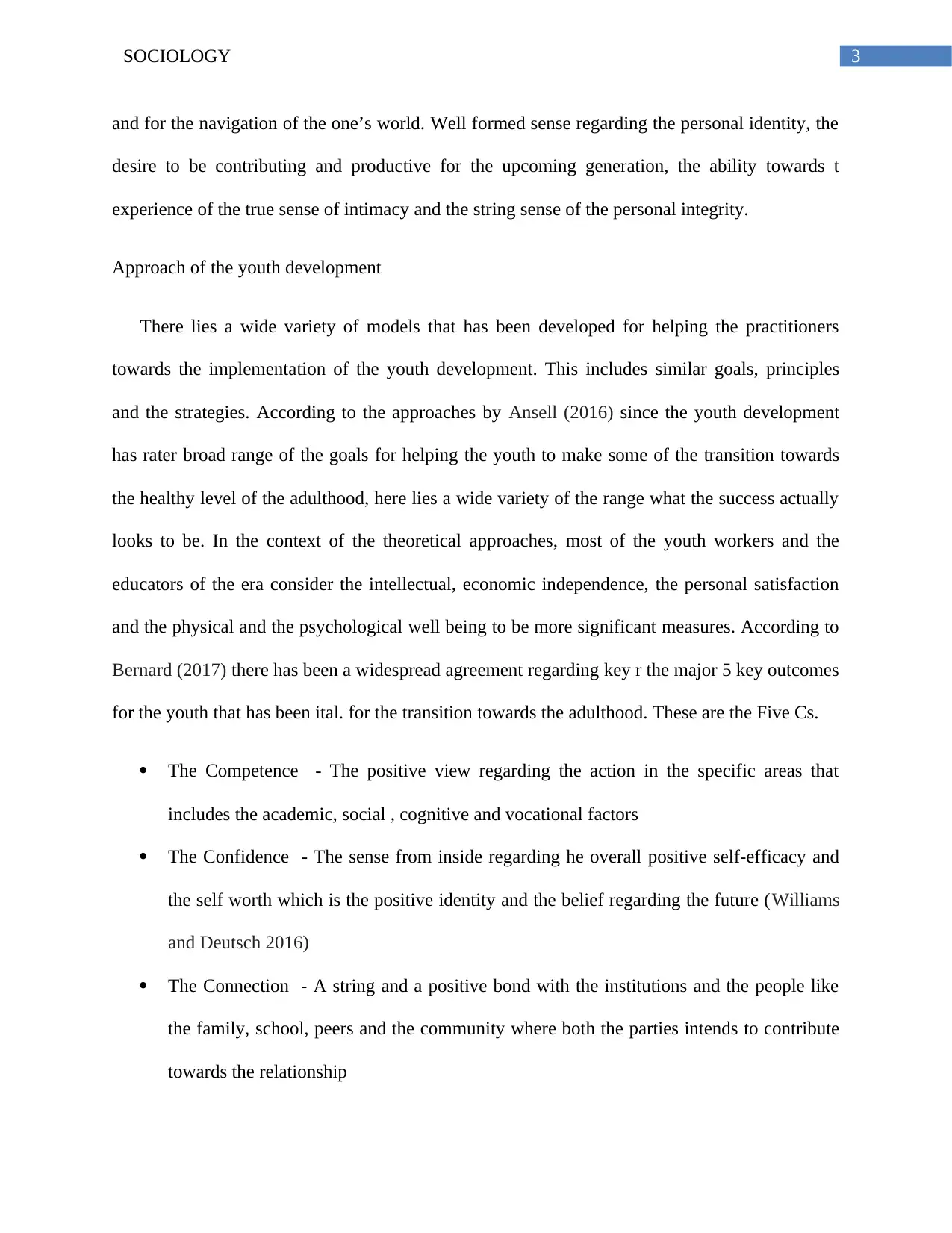
3SOCIOLOGY
and for the navigation of the one’s world. Well formed sense regarding the personal identity, the
desire to be contributing and productive for the upcoming generation, the ability towards t
experience of the true sense of intimacy and the string sense of the personal integrity.
Approach of the youth development
There lies a wide variety of models that has been developed for helping the practitioners
towards the implementation of the youth development. This includes similar goals, principles
and the strategies. According to the approaches by Ansell (2016) since the youth development
has rater broad range of the goals for helping the youth to make some of the transition towards
the healthy level of the adulthood, here lies a wide variety of the range what the success actually
looks to be. In the context of the theoretical approaches, most of the youth workers and the
educators of the era consider the intellectual, economic independence, the personal satisfaction
and the physical and the psychological well being to be more significant measures. According to
Bernard (2017) there has been a widespread agreement regarding key r the major 5 key outcomes
for the youth that has been ital. for the transition towards the adulthood. These are the Five Cs.
The Competence - The positive view regarding the action in the specific areas that
includes the academic, social , cognitive and vocational factors
The Confidence - The sense from inside regarding he overall positive self-efficacy and
the self worth which is the positive identity and the belief regarding the future (Williams
and Deutsch 2016)
The Connection - A string and a positive bond with the institutions and the people like
the family, school, peers and the community where both the parties intends to contribute
towards the relationship
and for the navigation of the one’s world. Well formed sense regarding the personal identity, the
desire to be contributing and productive for the upcoming generation, the ability towards t
experience of the true sense of intimacy and the string sense of the personal integrity.
Approach of the youth development
There lies a wide variety of models that has been developed for helping the practitioners
towards the implementation of the youth development. This includes similar goals, principles
and the strategies. According to the approaches by Ansell (2016) since the youth development
has rater broad range of the goals for helping the youth to make some of the transition towards
the healthy level of the adulthood, here lies a wide variety of the range what the success actually
looks to be. In the context of the theoretical approaches, most of the youth workers and the
educators of the era consider the intellectual, economic independence, the personal satisfaction
and the physical and the psychological well being to be more significant measures. According to
Bernard (2017) there has been a widespread agreement regarding key r the major 5 key outcomes
for the youth that has been ital. for the transition towards the adulthood. These are the Five Cs.
The Competence - The positive view regarding the action in the specific areas that
includes the academic, social , cognitive and vocational factors
The Confidence - The sense from inside regarding he overall positive self-efficacy and
the self worth which is the positive identity and the belief regarding the future (Williams
and Deutsch 2016)
The Connection - A string and a positive bond with the institutions and the people like
the family, school, peers and the community where both the parties intends to contribute
towards the relationship
Paraphrase This Document
Need a fresh take? Get an instant paraphrase of this document with our AI Paraphraser
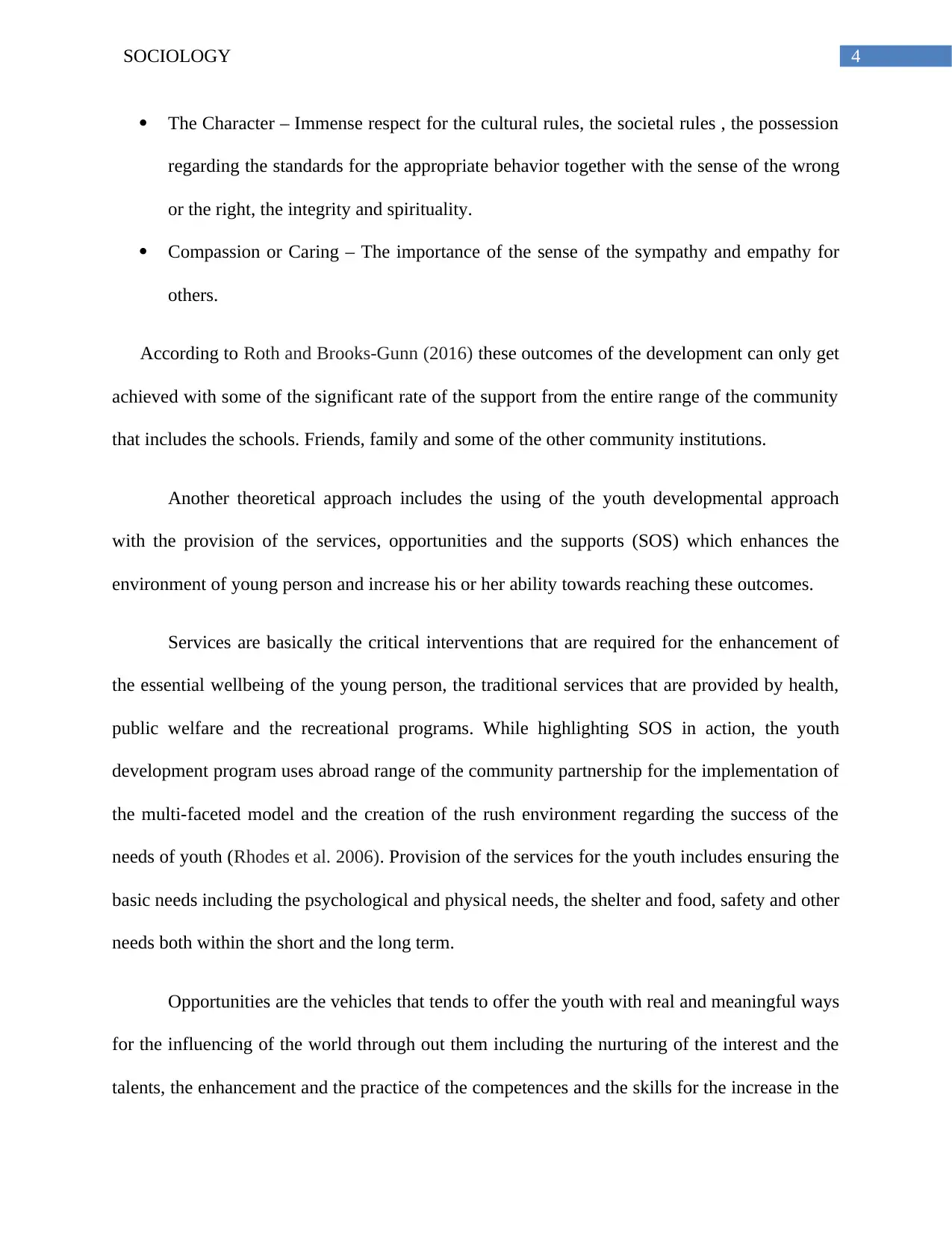
4SOCIOLOGY
The Character – Immense respect for the cultural rules, the societal rules , the possession
regarding the standards for the appropriate behavior together with the sense of the wrong
or the right, the integrity and spirituality.
Compassion or Caring – The importance of the sense of the sympathy and empathy for
others.
According to Roth and Brooks-Gunn (2016) these outcomes of the development can only get
achieved with some of the significant rate of the support from the entire range of the community
that includes the schools. Friends, family and some of the other community institutions.
Another theoretical approach includes the using of the youth developmental approach
with the provision of the services, opportunities and the supports (SOS) which enhances the
environment of young person and increase his or her ability towards reaching these outcomes.
Services are basically the critical interventions that are required for the enhancement of
the essential wellbeing of the young person, the traditional services that are provided by health,
public welfare and the recreational programs. While highlighting SOS in action, the youth
development program uses abroad range of the community partnership for the implementation of
the multi-faceted model and the creation of the rush environment regarding the success of the
needs of youth (Rhodes et al. 2006). Provision of the services for the youth includes ensuring the
basic needs including the psychological and physical needs, the shelter and food, safety and other
needs both within the short and the long term.
Opportunities are the vehicles that tends to offer the youth with real and meaningful ways
for the influencing of the world through out them including the nurturing of the interest and the
talents, the enhancement and the practice of the competences and the skills for the increase in the
The Character – Immense respect for the cultural rules, the societal rules , the possession
regarding the standards for the appropriate behavior together with the sense of the wrong
or the right, the integrity and spirituality.
Compassion or Caring – The importance of the sense of the sympathy and empathy for
others.
According to Roth and Brooks-Gunn (2016) these outcomes of the development can only get
achieved with some of the significant rate of the support from the entire range of the community
that includes the schools. Friends, family and some of the other community institutions.
Another theoretical approach includes the using of the youth developmental approach
with the provision of the services, opportunities and the supports (SOS) which enhances the
environment of young person and increase his or her ability towards reaching these outcomes.
Services are basically the critical interventions that are required for the enhancement of
the essential wellbeing of the young person, the traditional services that are provided by health,
public welfare and the recreational programs. While highlighting SOS in action, the youth
development program uses abroad range of the community partnership for the implementation of
the multi-faceted model and the creation of the rush environment regarding the success of the
needs of youth (Rhodes et al. 2006). Provision of the services for the youth includes ensuring the
basic needs including the psychological and physical needs, the shelter and food, safety and other
needs both within the short and the long term.
Opportunities are the vehicles that tends to offer the youth with real and meaningful ways
for the influencing of the world through out them including the nurturing of the interest and the
talents, the enhancement and the practice of the competences and the skills for the increase in the
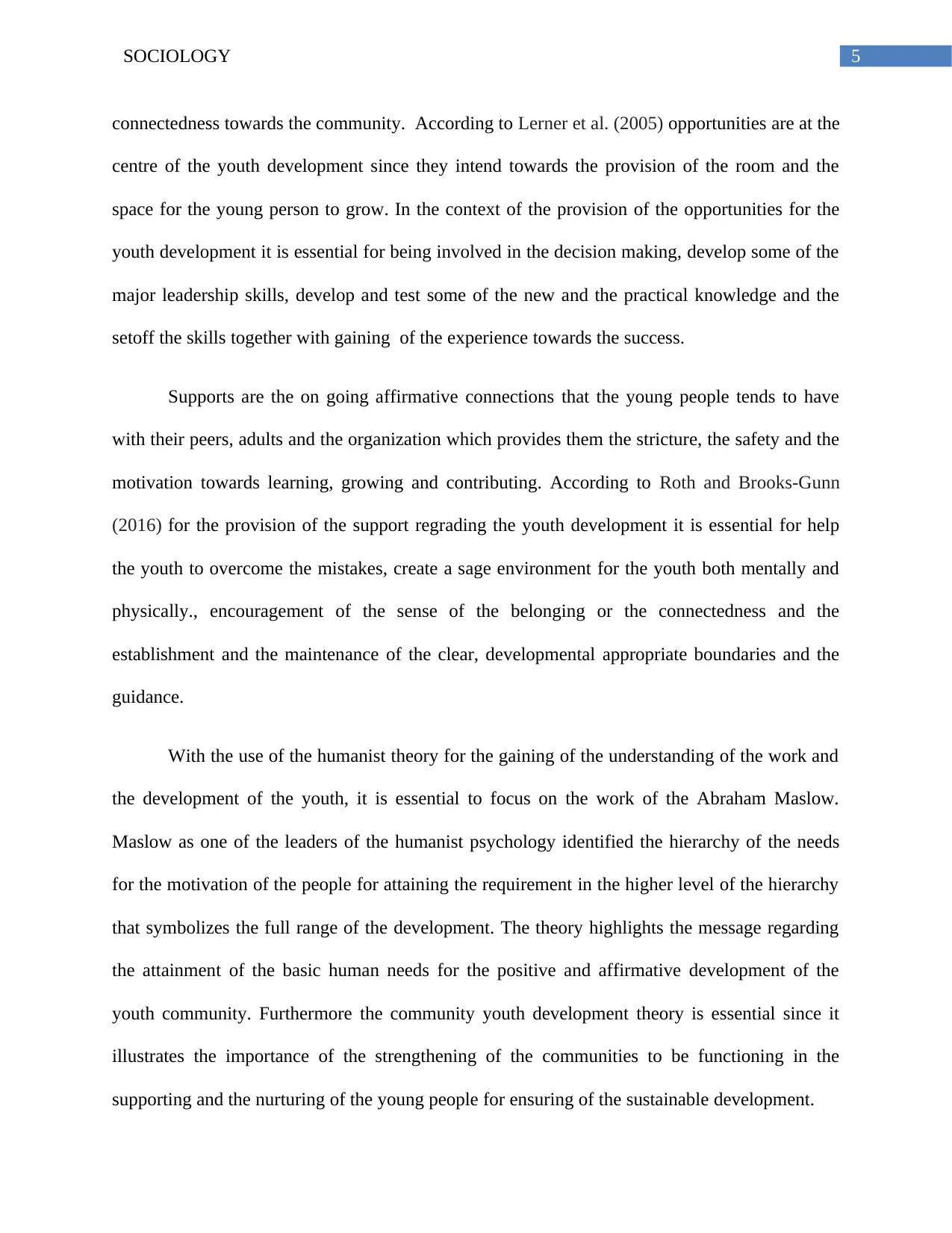
5SOCIOLOGY
connectedness towards the community. According to Lerner et al. (2005) opportunities are at the
centre of the youth development since they intend towards the provision of the room and the
space for the young person to grow. In the context of the provision of the opportunities for the
youth development it is essential for being involved in the decision making, develop some of the
major leadership skills, develop and test some of the new and the practical knowledge and the
setoff the skills together with gaining of the experience towards the success.
Supports are the on going affirmative connections that the young people tends to have
with their peers, adults and the organization which provides them the stricture, the safety and the
motivation towards learning, growing and contributing. According to Roth and Brooks-Gunn
(2016) for the provision of the support regrading the youth development it is essential for help
the youth to overcome the mistakes, create a sage environment for the youth both mentally and
physically., encouragement of the sense of the belonging or the connectedness and the
establishment and the maintenance of the clear, developmental appropriate boundaries and the
guidance.
With the use of the humanist theory for the gaining of the understanding of the work and
the development of the youth, it is essential to focus on the work of the Abraham Maslow.
Maslow as one of the leaders of the humanist psychology identified the hierarchy of the needs
for the motivation of the people for attaining the requirement in the higher level of the hierarchy
that symbolizes the full range of the development. The theory highlights the message regarding
the attainment of the basic human needs for the positive and affirmative development of the
youth community. Furthermore the community youth development theory is essential since it
illustrates the importance of the strengthening of the communities to be functioning in the
supporting and the nurturing of the young people for ensuring of the sustainable development.
connectedness towards the community. According to Lerner et al. (2005) opportunities are at the
centre of the youth development since they intend towards the provision of the room and the
space for the young person to grow. In the context of the provision of the opportunities for the
youth development it is essential for being involved in the decision making, develop some of the
major leadership skills, develop and test some of the new and the practical knowledge and the
setoff the skills together with gaining of the experience towards the success.
Supports are the on going affirmative connections that the young people tends to have
with their peers, adults and the organization which provides them the stricture, the safety and the
motivation towards learning, growing and contributing. According to Roth and Brooks-Gunn
(2016) for the provision of the support regrading the youth development it is essential for help
the youth to overcome the mistakes, create a sage environment for the youth both mentally and
physically., encouragement of the sense of the belonging or the connectedness and the
establishment and the maintenance of the clear, developmental appropriate boundaries and the
guidance.
With the use of the humanist theory for the gaining of the understanding of the work and
the development of the youth, it is essential to focus on the work of the Abraham Maslow.
Maslow as one of the leaders of the humanist psychology identified the hierarchy of the needs
for the motivation of the people for attaining the requirement in the higher level of the hierarchy
that symbolizes the full range of the development. The theory highlights the message regarding
the attainment of the basic human needs for the positive and affirmative development of the
youth community. Furthermore the community youth development theory is essential since it
illustrates the importance of the strengthening of the communities to be functioning in the
supporting and the nurturing of the young people for ensuring of the sustainable development.
⊘ This is a preview!⊘
Do you want full access?
Subscribe today to unlock all pages.

Trusted by 1+ million students worldwide
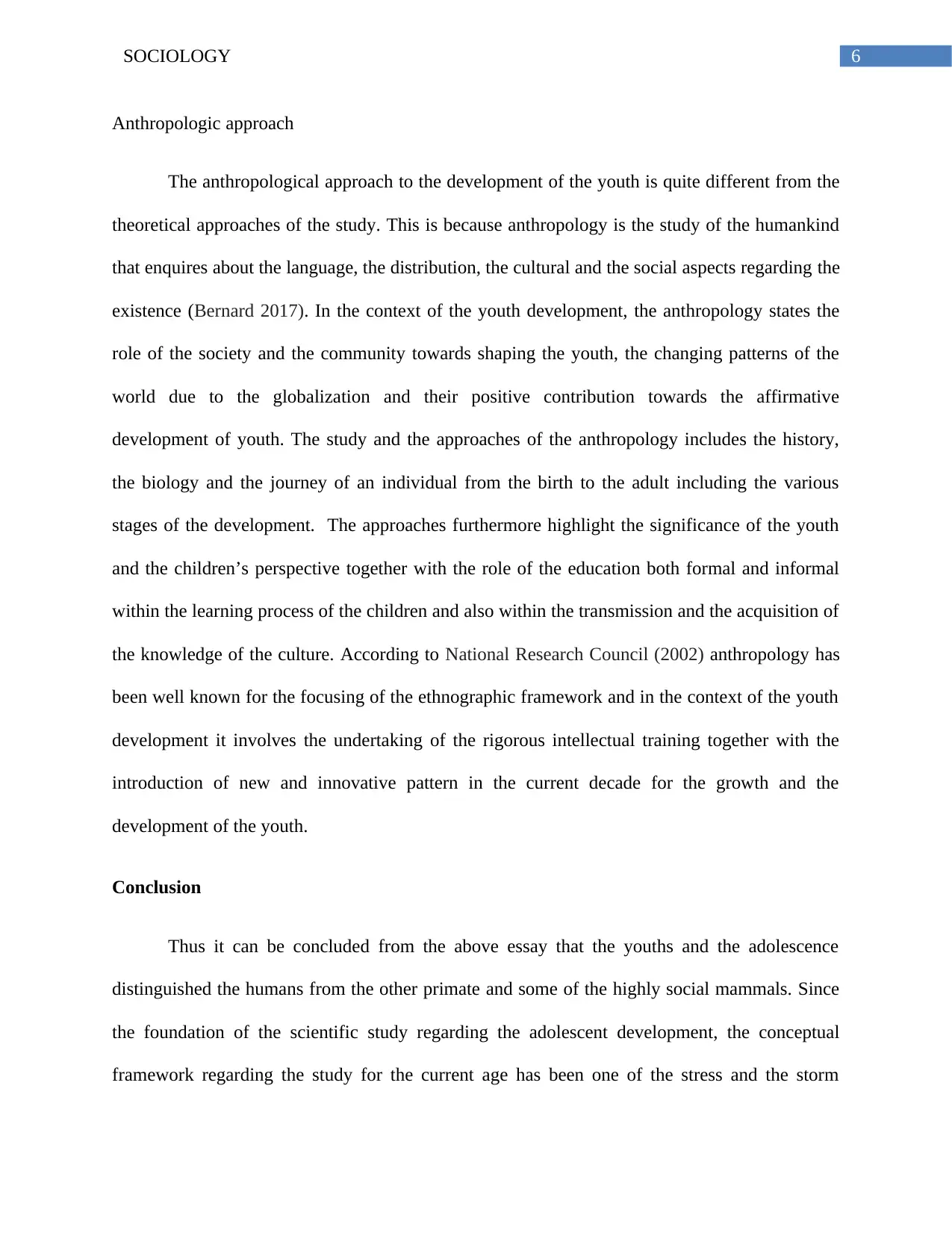
6SOCIOLOGY
Anthropologic approach
The anthropological approach to the development of the youth is quite different from the
theoretical approaches of the study. This is because anthropology is the study of the humankind
that enquires about the language, the distribution, the cultural and the social aspects regarding the
existence (Bernard 2017). In the context of the youth development, the anthropology states the
role of the society and the community towards shaping the youth, the changing patterns of the
world due to the globalization and their positive contribution towards the affirmative
development of youth. The study and the approaches of the anthropology includes the history,
the biology and the journey of an individual from the birth to the adult including the various
stages of the development. The approaches furthermore highlight the significance of the youth
and the children’s perspective together with the role of the education both formal and informal
within the learning process of the children and also within the transmission and the acquisition of
the knowledge of the culture. According to National Research Council (2002) anthropology has
been well known for the focusing of the ethnographic framework and in the context of the youth
development it involves the undertaking of the rigorous intellectual training together with the
introduction of new and innovative pattern in the current decade for the growth and the
development of the youth.
Conclusion
Thus it can be concluded from the above essay that the youths and the adolescence
distinguished the humans from the other primate and some of the highly social mammals. Since
the foundation of the scientific study regarding the adolescent development, the conceptual
framework regarding the study for the current age has been one of the stress and the storm
Anthropologic approach
The anthropological approach to the development of the youth is quite different from the
theoretical approaches of the study. This is because anthropology is the study of the humankind
that enquires about the language, the distribution, the cultural and the social aspects regarding the
existence (Bernard 2017). In the context of the youth development, the anthropology states the
role of the society and the community towards shaping the youth, the changing patterns of the
world due to the globalization and their positive contribution towards the affirmative
development of youth. The study and the approaches of the anthropology includes the history,
the biology and the journey of an individual from the birth to the adult including the various
stages of the development. The approaches furthermore highlight the significance of the youth
and the children’s perspective together with the role of the education both formal and informal
within the learning process of the children and also within the transmission and the acquisition of
the knowledge of the culture. According to National Research Council (2002) anthropology has
been well known for the focusing of the ethnographic framework and in the context of the youth
development it involves the undertaking of the rigorous intellectual training together with the
introduction of new and innovative pattern in the current decade for the growth and the
development of the youth.
Conclusion
Thus it can be concluded from the above essay that the youths and the adolescence
distinguished the humans from the other primate and some of the highly social mammals. Since
the foundation of the scientific study regarding the adolescent development, the conceptual
framework regarding the study for the current age has been one of the stress and the storm
Paraphrase This Document
Need a fresh take? Get an instant paraphrase of this document with our AI Paraphraser
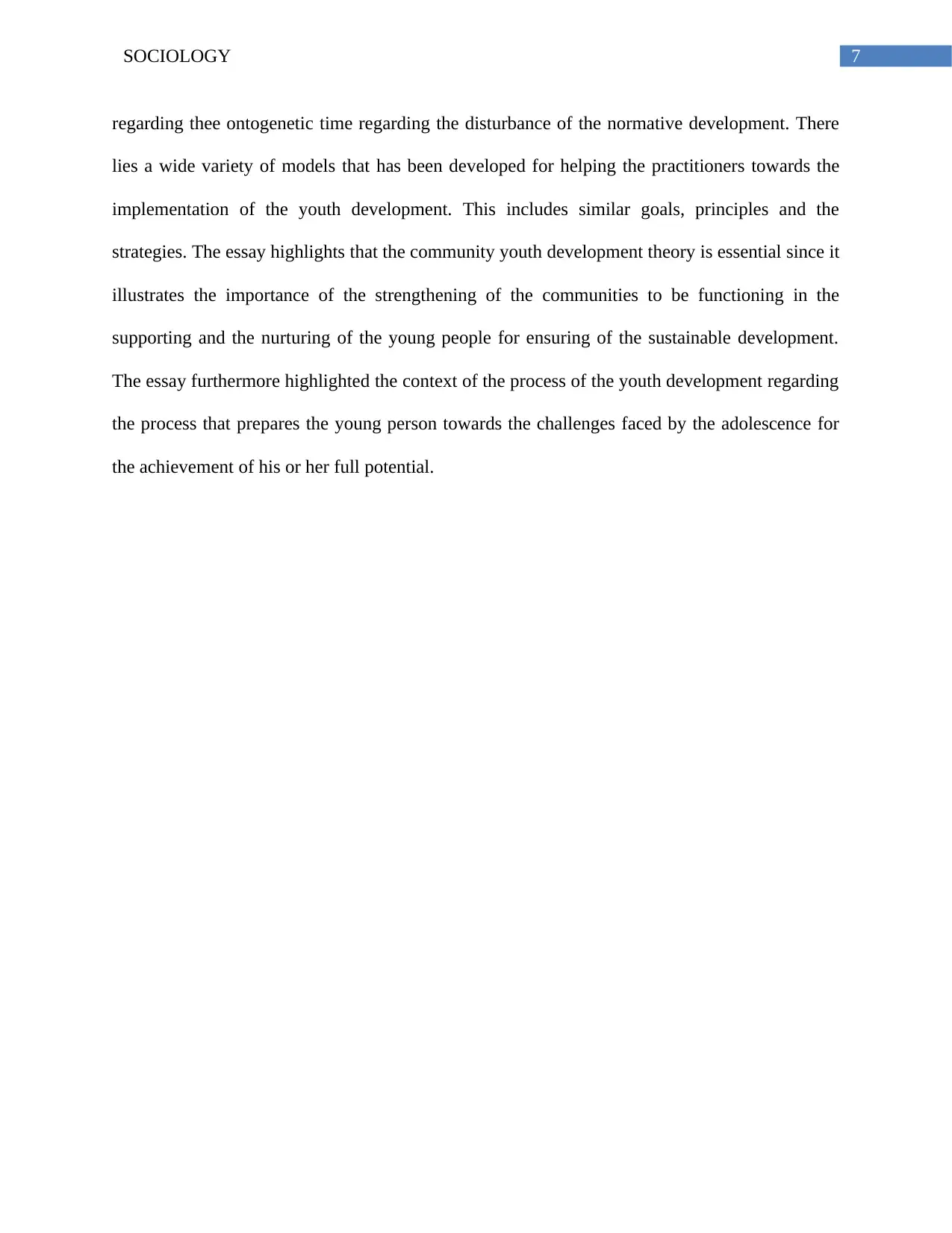
7SOCIOLOGY
regarding thee ontogenetic time regarding the disturbance of the normative development. There
lies a wide variety of models that has been developed for helping the practitioners towards the
implementation of the youth development. This includes similar goals, principles and the
strategies. The essay highlights that the community youth development theory is essential since it
illustrates the importance of the strengthening of the communities to be functioning in the
supporting and the nurturing of the young people for ensuring of the sustainable development.
The essay furthermore highlighted the context of the process of the youth development regarding
the process that prepares the young person towards the challenges faced by the adolescence for
the achievement of his or her full potential.
regarding thee ontogenetic time regarding the disturbance of the normative development. There
lies a wide variety of models that has been developed for helping the practitioners towards the
implementation of the youth development. This includes similar goals, principles and the
strategies. The essay highlights that the community youth development theory is essential since it
illustrates the importance of the strengthening of the communities to be functioning in the
supporting and the nurturing of the young people for ensuring of the sustainable development.
The essay furthermore highlighted the context of the process of the youth development regarding
the process that prepares the young person towards the challenges faced by the adolescence for
the achievement of his or her full potential.
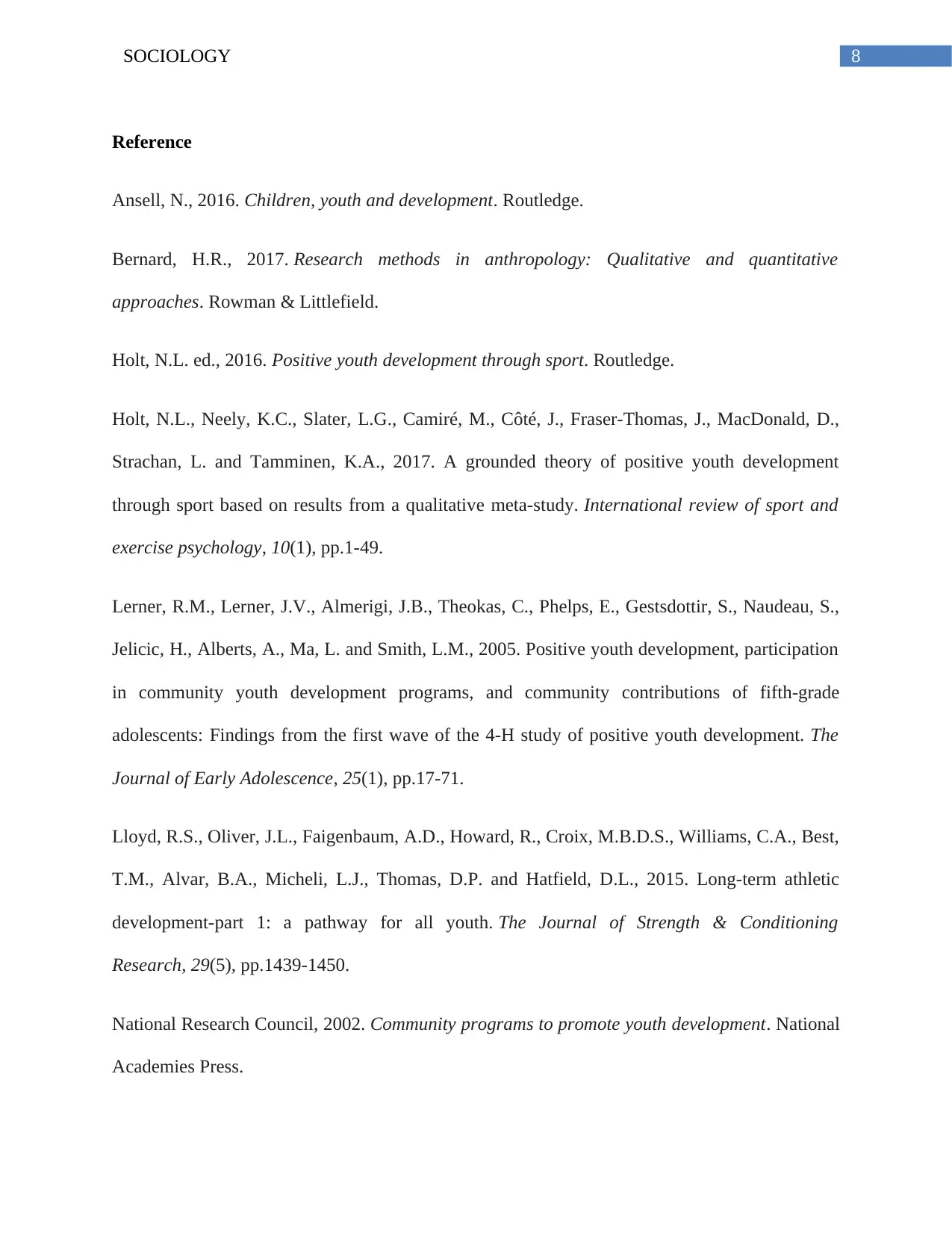
8SOCIOLOGY
Reference
Ansell, N., 2016. Children, youth and development. Routledge.
Bernard, H.R., 2017. Research methods in anthropology: Qualitative and quantitative
approaches. Rowman & Littlefield.
Holt, N.L. ed., 2016. Positive youth development through sport. Routledge.
Holt, N.L., Neely, K.C., Slater, L.G., Camiré, M., Côté, J., Fraser-Thomas, J., MacDonald, D.,
Strachan, L. and Tamminen, K.A., 2017. A grounded theory of positive youth development
through sport based on results from a qualitative meta-study. International review of sport and
exercise psychology, 10(1), pp.1-49.
Lerner, R.M., Lerner, J.V., Almerigi, J.B., Theokas, C., Phelps, E., Gestsdottir, S., Naudeau, S.,
Jelicic, H., Alberts, A., Ma, L. and Smith, L.M., 2005. Positive youth development, participation
in community youth development programs, and community contributions of fifth-grade
adolescents: Findings from the first wave of the 4-H study of positive youth development. The
Journal of Early Adolescence, 25(1), pp.17-71.
Lloyd, R.S., Oliver, J.L., Faigenbaum, A.D., Howard, R., Croix, M.B.D.S., Williams, C.A., Best,
T.M., Alvar, B.A., Micheli, L.J., Thomas, D.P. and Hatfield, D.L., 2015. Long-term athletic
development-part 1: a pathway for all youth. The Journal of Strength & Conditioning
Research, 29(5), pp.1439-1450.
National Research Council, 2002. Community programs to promote youth development. National
Academies Press.
Reference
Ansell, N., 2016. Children, youth and development. Routledge.
Bernard, H.R., 2017. Research methods in anthropology: Qualitative and quantitative
approaches. Rowman & Littlefield.
Holt, N.L. ed., 2016. Positive youth development through sport. Routledge.
Holt, N.L., Neely, K.C., Slater, L.G., Camiré, M., Côté, J., Fraser-Thomas, J., MacDonald, D.,
Strachan, L. and Tamminen, K.A., 2017. A grounded theory of positive youth development
through sport based on results from a qualitative meta-study. International review of sport and
exercise psychology, 10(1), pp.1-49.
Lerner, R.M., Lerner, J.V., Almerigi, J.B., Theokas, C., Phelps, E., Gestsdottir, S., Naudeau, S.,
Jelicic, H., Alberts, A., Ma, L. and Smith, L.M., 2005. Positive youth development, participation
in community youth development programs, and community contributions of fifth-grade
adolescents: Findings from the first wave of the 4-H study of positive youth development. The
Journal of Early Adolescence, 25(1), pp.17-71.
Lloyd, R.S., Oliver, J.L., Faigenbaum, A.D., Howard, R., Croix, M.B.D.S., Williams, C.A., Best,
T.M., Alvar, B.A., Micheli, L.J., Thomas, D.P. and Hatfield, D.L., 2015. Long-term athletic
development-part 1: a pathway for all youth. The Journal of Strength & Conditioning
Research, 29(5), pp.1439-1450.
National Research Council, 2002. Community programs to promote youth development. National
Academies Press.
⊘ This is a preview!⊘
Do you want full access?
Subscribe today to unlock all pages.

Trusted by 1+ million students worldwide
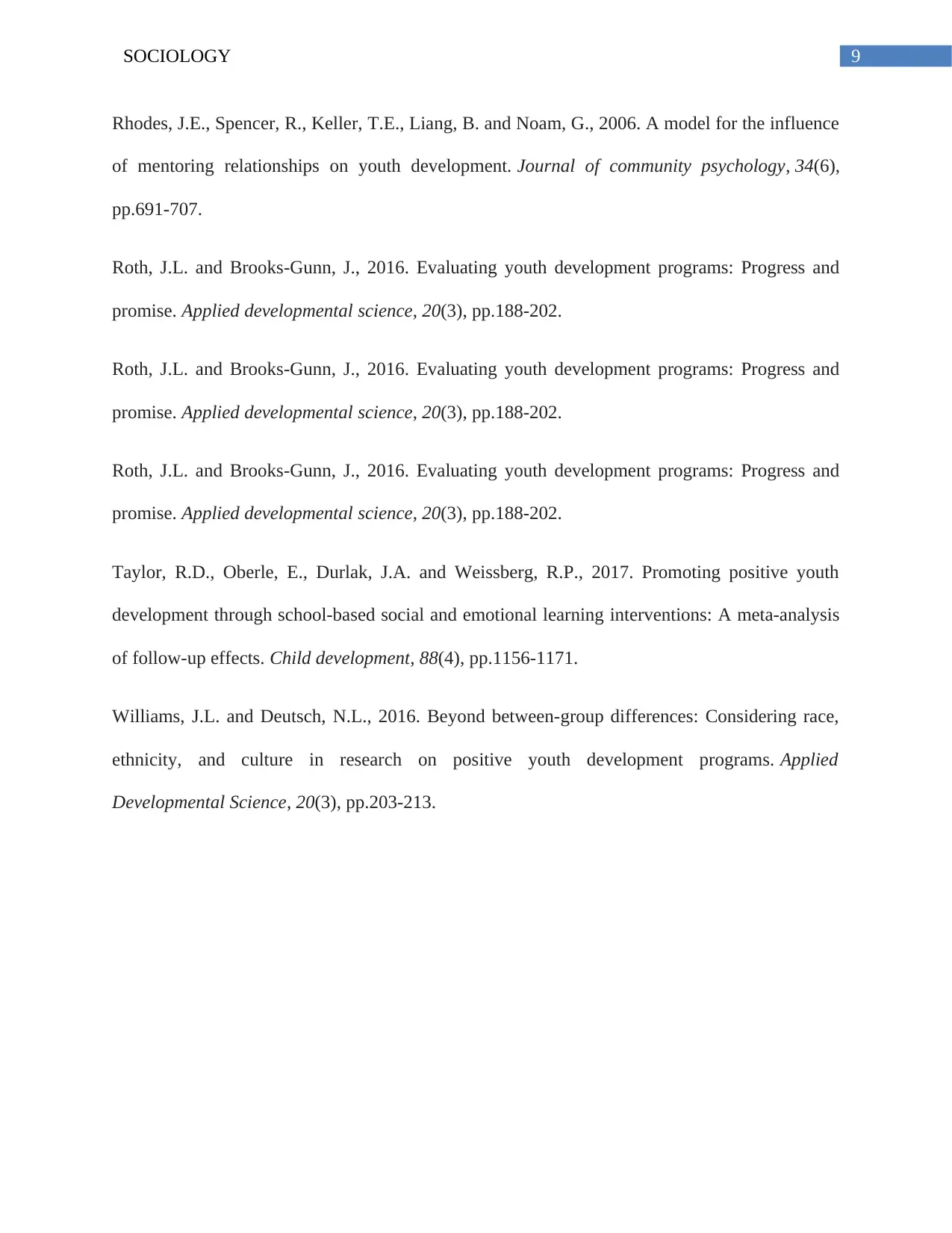
9SOCIOLOGY
Rhodes, J.E., Spencer, R., Keller, T.E., Liang, B. and Noam, G., 2006. A model for the influence
of mentoring relationships on youth development. Journal of community psychology, 34(6),
pp.691-707.
Roth, J.L. and Brooks-Gunn, J., 2016. Evaluating youth development programs: Progress and
promise. Applied developmental science, 20(3), pp.188-202.
Roth, J.L. and Brooks-Gunn, J., 2016. Evaluating youth development programs: Progress and
promise. Applied developmental science, 20(3), pp.188-202.
Roth, J.L. and Brooks-Gunn, J., 2016. Evaluating youth development programs: Progress and
promise. Applied developmental science, 20(3), pp.188-202.
Taylor, R.D., Oberle, E., Durlak, J.A. and Weissberg, R.P., 2017. Promoting positive youth
development through school‐based social and emotional learning interventions: A meta‐analysis
of follow‐up effects. Child development, 88(4), pp.1156-1171.
Williams, J.L. and Deutsch, N.L., 2016. Beyond between-group differences: Considering race,
ethnicity, and culture in research on positive youth development programs. Applied
Developmental Science, 20(3), pp.203-213.
Rhodes, J.E., Spencer, R., Keller, T.E., Liang, B. and Noam, G., 2006. A model for the influence
of mentoring relationships on youth development. Journal of community psychology, 34(6),
pp.691-707.
Roth, J.L. and Brooks-Gunn, J., 2016. Evaluating youth development programs: Progress and
promise. Applied developmental science, 20(3), pp.188-202.
Roth, J.L. and Brooks-Gunn, J., 2016. Evaluating youth development programs: Progress and
promise. Applied developmental science, 20(3), pp.188-202.
Roth, J.L. and Brooks-Gunn, J., 2016. Evaluating youth development programs: Progress and
promise. Applied developmental science, 20(3), pp.188-202.
Taylor, R.D., Oberle, E., Durlak, J.A. and Weissberg, R.P., 2017. Promoting positive youth
development through school‐based social and emotional learning interventions: A meta‐analysis
of follow‐up effects. Child development, 88(4), pp.1156-1171.
Williams, J.L. and Deutsch, N.L., 2016. Beyond between-group differences: Considering race,
ethnicity, and culture in research on positive youth development programs. Applied
Developmental Science, 20(3), pp.203-213.
1 out of 10
Related Documents
Your All-in-One AI-Powered Toolkit for Academic Success.
+13062052269
info@desklib.com
Available 24*7 on WhatsApp / Email
![[object Object]](/_next/static/media/star-bottom.7253800d.svg)
Unlock your academic potential
Copyright © 2020–2026 A2Z Services. All Rights Reserved. Developed and managed by ZUCOL.




